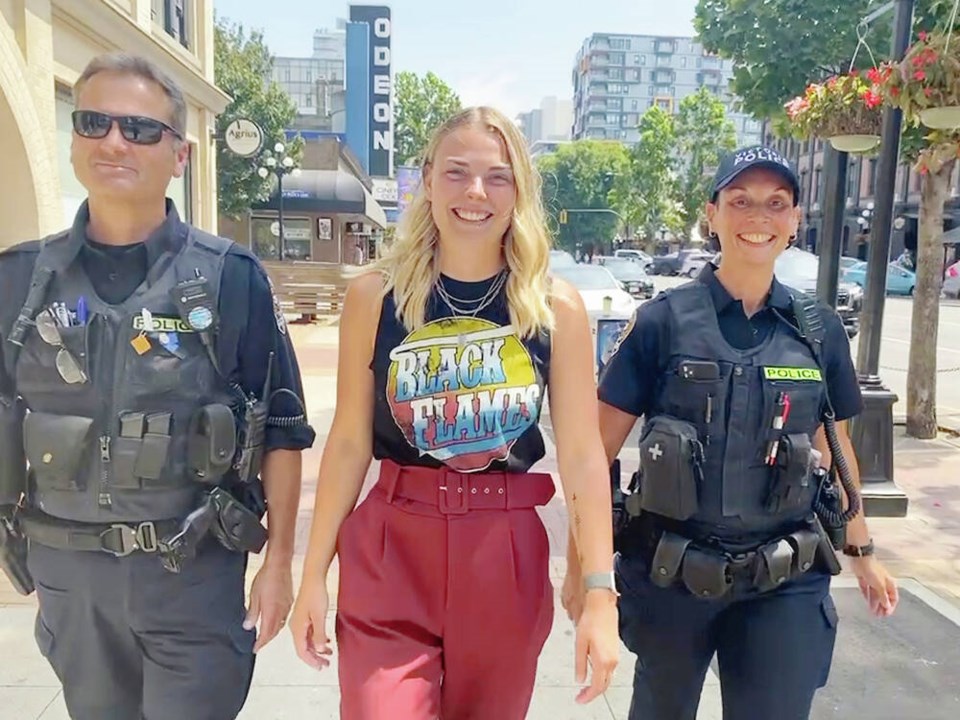The hiring of an in-house psychologist for Victoria police officers and staff will be a “game changer,” says the police chief.
Dr. Lydia Vallieres joined VicPD last week as a part-time psychologist working two days a week.
Over the past few years, the severity and frequency of trauma that officers and staff face has significantly increased, said Chief Del Manak.
“It’s no longer an anomaly or a one-off, when our officers are responding to somebody who’s in a mental-health crisis, somebody who’s suicidal,” he said.
The goal of hiring an in-house psychologist is to proactively support the mental health of all VicPD staff by having a professional who is available in their workplace and without the need for an appointment, he said. Manak hopes that early intervention will help officers and staff get the help they need before they reach a point where they need to take a leave from work.
At any given time, about 10 to 15 of the department’s 255 officers are off work for psychological injuries, he said.
Sometimes the trauma of accumulated incidents can affect an officer’s mental health without them fully realizing it.
Manak said one officer who is currently off the job for psychological injuries had gone to more than 65 calls for suicide attempts or sudden deaths. It took one incident of responding to a call from a concerned family member and checking on the loved one to find they had killed themselves to put him over the edge so that he could no longer work.
“The fact that he had all of these sudden death investigations or suicidal calls that he was responding to clearly was taking a toll on his mental health and he never really reached out to anyone for those,” Manak said.
With a psychologist in the building, the message he wants to send is that supporting the mental well-being of officers and staff is essential and they can speak to someone as soon as they’re struggling.
Manak said it’s unusual for a force the size of VicPD to have its own psychologist. VicPD received guidance from York Regional Police in Ontario, which has 2,700 officers and multiple psychologists on its mental-health team, he said.
The hiring of a psychologist shows the department is taking a progressive stance on mental health, said Angela Van Eerd, secretary of the Victoria City Police Union and a detective in VicPD’s special victims unit.
When she first joined the department 16 years ago, physical fitness was hugely important.
She’s encouraged to see that VicPD is recognizing the necessity of mental fitness as well.
The union and VicPD put out a survey a couple of years ago that found members were burnt out and it was clear a strategy was needed to take care of members, Van Eerd said.
“We’re going to have a trained professional who has experience in this realm and we’re going to have access to them more than we’ve ever had before. So, it’s going to be incredible in terms of when there’s a critical incident,” she said.
VicPD also has a peer counselling program and mandatory annual wellness checks for officers in some positions that are exposed to high levels of trauma. The department will be making those checks mandatory for all officers and civilian staff, Manak said.
Van Eerd has received annual checks as part of her role in the special victims unit and said she finds them helpful. The nature of the work means that there’s always another call and many officers bury the challenges they’re facing out of necessity, she said. “Sometimes members don’t realize that something could be bothering them or that talking about it could actually help. You know, because people keep things close to them, and people bury it. That’s kind of the culture of policing is you have to go to sometimes horrendous calls and you then don’t get a chance to actually think about what you just experienced, and then you’re on to the next call.”
>>> To comment on this article, write a letter to the editor: [email protected]



